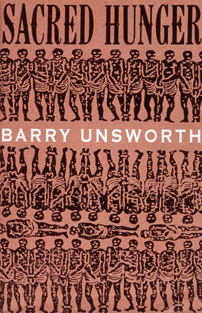 This particular tome shared the 1992 Booker Prize with the somewhat better-known The English Patient by Michael Ondaatje – a novel that went on to be adapted for the silver screen, starred Ralph Fiennes, Kristin Scott-Thomas and Juliet Binoche and won nine 1997 Oscars, including best film.
This particular tome shared the 1992 Booker Prize with the somewhat better-known The English Patient by Michael Ondaatje – a novel that went on to be adapted for the silver screen, starred Ralph Fiennes, Kristin Scott-Thomas and Juliet Binoche and won nine 1997 Oscars, including best film.
Barry Unsworth’s superb novel, meanwhile, has been left languishing on the bookshelves, somewhat forgotten and undervalued. Sacred Hunger is no mean undertaking at nearly 700 pages. Yet it is worth every one of them.
A book of two parts – the first two taking place simultaneously in Liverpool and aboard the slave ship, the Liverpool Merchant, in 1752-1753: the second moves forward 12 years to the Florida swamps. A story of power, greed and arrogance on the one hand and human suffering on another, it can leave you, at times, quite breathless.
Having overextended himself by borrowing against his wealth from the sugar trade, William Kemp is now in serious debt. He turns to one of the most lucrative of all trades in the late 18th century – slavery and the transportation of men, women and children from the west African coast to the Indies and Americas. Commissioning the Liverpool Merchant in the hope of clearing those debts, Kemp sets in motion a series of events which lead to his early death, family bankruptcy and mutiny on the high seas.
Captained by the sadistic Thurso, the Liverpool Merchant heads for Africa and its promised wealth. His final passage, Thurso has an agenda of his own. On board is Kemp’s nephew, Matthew Paris, a man in disgrace having been imprisoned for publishing sacrilegious tracts. The inhumanity, brutality, hardships and privations on the ship are juxtaposed with the dandified life back in England as young Eramus Kemp woos Sarah Wolpert, the daughter of one of the wealthiest men in the north.
Twelve years later, the elder Kemp is dead, the Liverpool Merchant long lost and the rich and powerful Erasmus Kemp has cleared his father’s debts and risen to prominence in the world of trade. The scandal around his father’s death ensured the marriage between Erasmus and his beloved Sarah never came to fruition. A loveless marriage, but worth a small fortune, followed. And then comes news that the Liverpool Merchant was not lost at sea and a mixed community of black and white was living in the inaccessible Florida swamps…
Convinced his hated cousin had a part to play in the loss of the slave ship and the early death of Kemp senior, Erasmus Kemp sets off for the new English colony determined to gain justice.
Sacred Hunger is a complex, unsettling parable. From the off, the story is of the characters who make up the novel. Short narratives introduce dock workers, crew members, merchants, aristocrats et al. And this sets the tone – Sacred Hunger is essentially about its people and their position in place and time. It is they who drive the narrative and it is they to whom we relate (or not).
Pompous Erasmus Kemp has spent his life consumed by his own ghosts. His once proud cousin Matthew Paris discovers humility and sense of himself aboard the Liverpool Merchant. But we also meet any number of characters – pressganged crew members Billy Blair, Michael Sullivan and slow-witted Daniel, the chameleon-like First Mate, Barton: English society members rehearsing Shakespeare’s The Tempest, including a reluctant Erasmus Kemp and the local pastor (how appropriate a choice of play that turns out to be!). And, on the enchanted island of their own, the isolated community include the likes of Kireku, Tabakali and a rejuvenated Paris.
Barry Unsworth writes of morality and moral choices. In the utopian society, Kireku demands a form of enslavement and financial gain in the same way the Governor of Florida talks of the native Creek Indian population: English colonial aspirations are readily mirrored in the anti-aristocratic Thurso’s smash and grab tactics on the African coast.
Sacred Hunger is a quietly devastating novel, laying bare man’s greed and inhumanity to one another at the prospect of making a quick buck or scoring an advantage.
“Nothing a man suffers will prevent him from inflicting suffering on others. Indeed, it will teach him the way”.
But Unsworth also explores the wealth of hope within humanity, in spite of the horrors contained within the telling of the story of the doomed Liverpool Merchant, its crew and ‘cargo’.
